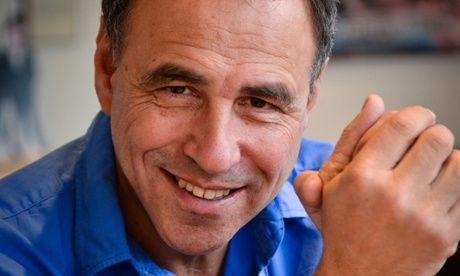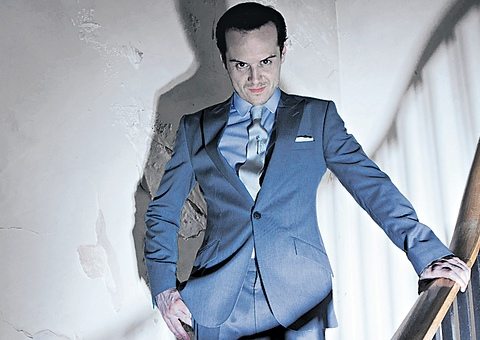‘I was called names when I was eight,” says Anthony Horowitz. “I will not tell you them now because I would be physically sick if they passed my lips.” The writer pauses momentarily, his brown eyes fixing mine. “I just couldn’t do it. These things do hurt.”
Tall, slim and wearing black jeans, the 62-year-old could, until this moment, have passed for a much younger man. But as he recalls his childhood, suddenly the years seem to catch up with him. We meet in the London offices of the TV production company run by his wife, Jill Green, to chat about his latest novel, The Word Is Murder. We are a stone’s throw from their penthouse in a renovated bacon factory. It seems rather fitting – because he certainly brings home the bacon. Horowitz, who has houses in Crete, Suffolk and London, is one of the highest earning writers in Britain.
On the walls are testimonies to his success: framed covers of his multi-million-selling Alex Rider novels about the boy recruited by MI6, whose adventures were turned into a film in 2006; a giant poster for his wartime detective drama Foyle’s War; and shelves laden with books and DVDs of his many hit shows, including New Blood, Injustice and Midsomer Murders. But for all this success, he is still haunted by a childhood of superficial comfort. His father was a solicitor, known as a something of a fixer for prime minister Harold Wilson. His nefarious business dealings weren’t revealed until his death: his millions had been squirrelled into Swiss bank accounts under assumed names; the money was never recovered and the shock of the family’s bankruptcy for Horowitz, then 23, gave him a lifelong horror of debt – and a ferocious work ethic.
What was lost was considerable: the family home, White Friars, was so big that when demolished it was replaced by no fewer than 16 five-bedroom houses. Both his parents were away much of the time, leaving Horowitz and his two siblings in the care of servants and his grandmother, a woman of such hellish cruelty he used her as the template for the eponymous villain in his children’s novel Granny.
Being packed off to boarding school at the age of eight could have been an escape. But this was the 1960s, when beatings were a way of life in such schools. At Orley Farm in Harrow, Horowitz was often left bleeding after six of the best. He worries that remembering such things sounds like whingeing, when other children lived in dire poverty. But, as the patron of the anti-bullying charity Kidscape, he says: “Emotional cruelty ignores wealth and position.” Such vicious treatment of children in boarding schools in the 60s, he believes, has had a detrimental impact on society. “It is why so much of this country is dysfunctional.”
It was not just the beatings that scarred the writer: being plump and Jewish made him an easy target for other boys. At night, he escaped by telling stories to schoolmates after lights out in his dorm. In those tales, he found salvation and developed an ambition to be a writer. It is clearly painful to recall. Why does he talk about it? “For one very simple reason,” he snaps back, with barely concealed irritation. “People like yourself always ask about it.”
I ask if he’d rather not be asked about his childhood and there is a long pause. “It’s not my business to tell you what you can and can’t ask me,” he says eventually. Written down, the words look harsher than they sound. “No, I’m happy to talk about it because…” He pauses, pressing his hands into his lap like a schoolboy sitting outside the head’s office. The PR sharing the room with us, nods and he enters into a convoluted explanation about how he regards the granting of an interview for publicity as a kind of contract in which “I provide you with the material you want”.
The PR, I suspect, is here to protect a writer with a reputation for shooting from the lip, making him a gift to headline-writers, which is why his audiences at book festivals are always peppered with reporters scribbling away. This very day, the Times is running with a story picked up from an event at the Edinburgh festival, in which he contested that theatres should not give critics free tickets because a savaging can kill a show. Within days, the Stage responded with an article by an actor in his play Dinner With Saddam castigating Horowitz for writing a flop that “shoehorned the tragedy of the 2003 invasion of Iraq into the format of a bawdy 1970s British sitcom”.
Although the father of two insists he is inured to such coverage, the admission that his son Cass offered to sit in on our interview suggests that it does get to him. In May, the Mail on Sunday reported that he accused his publisher, Walker, of pressuring him into dropping a black character because of “cultural appropriation”.
A Twitter storm erupted, led by Rivers of London writer Ben Aaronovitch. “If you don’t feel confident or just don’t want to write black characters, just say so,” he seethed. “Don’t pretend it’s political correctness gone mad.” Authors of colour, including Orangeboy writer Patrice Lawrence, accused the Rugby alumnus of hijacking the issue of diversity in fiction.
Horowitz sighs when I ask about the claim, strenuously denied by Walker. “I didn’t say anything that can be construed as contrary,” he says. “I was merely drawing attention to this movement of cultural appropriation, which is very strong in America.” His voice rises an octave and he adds: “I am not saying that it is shocking or wrong or disgusting. I did say, however, that its natural outcome would be that I would end up only writing about 63-year-old writers who live in Clerkenwell and have two sons.” He praises Lionel Shriver – “whose work I love” – for speaking out on the subject and insists that, far from disagreeing with political correctness, he regards it as “absolutely 100% right”.
The mobbing disturbs him, though. He thinks it’s symptomatic of a rage in society that has grown since the Brexit vote. “There is a rigidity in the way we have begun to think and speak. If we step outside certain lines on certain issues, we find not just people disagreeing, but disagreeing to the extent of death threats. When somebody says something untoward in the press, and I am not saying this about myself, people don’t just say that was a stupid thing to say. They say, ‘Lose your job.’ They want you to never ever have an income again.”
It is a theme that emerges in the new novel. The Word Is Murder is first in a series about Hawthorne, an ex-cop turned gumshoe who seems to be straight out of central casting: ageing loner, problems with authority, smoker, secretive, divorced. But, as the novel progresses, the carapace is demolished and, Horowitz promises, the next eight or nine books (he is undecided) will provide surprising revelations.
The book could be seen as Horowitz’s most audacious yet, since he has taken the unusual step of placing himself at the centre of the story, narrating Hawthorne’s exploits. It is an attempt at meta-fiction more usually the preserve of self-consciously literary writers like Martin Amis or Bret Easton Ellis and the author admits being nervous about the reception of his 46th novel. The book certainly has its moments, in particular the laugh-out-loud funeral scene and a chapter in which Steven Spielberg and Peter Jackson discuss Horowitz’s screenplay for a Tintin movie. It is based on a real meeting he had in Paris.
With 10 million words under his belt, Horowitz has long toyed with penning a guide that details everything from how to plot a novel to how to deal with TV executives. “I even started to write it. But it was dull and slightly arrogant and, at the end of the day, it just didn’t interest me.” He laughs, unfazed by failure, which he regards as a healthy corrective.
Whatever happens with this book, it will not hold back the creator of Alex Rider, who rattles off the projects he wishes to complete: a new children’s trilogy, more novels for adults, and several plays. As he talks, I can’t help thinking of that chubby schoolboy who tells stories to keep his spirits up in a school he will one day describe as a “cesspit”.
“My writing has saved me,” he says. “Simple as that.” He looks sheepish, before breaking into a smile. “When I was 10, and inadequate in many ways, writing was a lifeline. Now I have my life pretty much sorted out. In a world where everything seems to be uncertain, writing is the only certainty I have.”
- The Word Is Murder by is published by Century. It’s available at the Guardian Bookshop.











